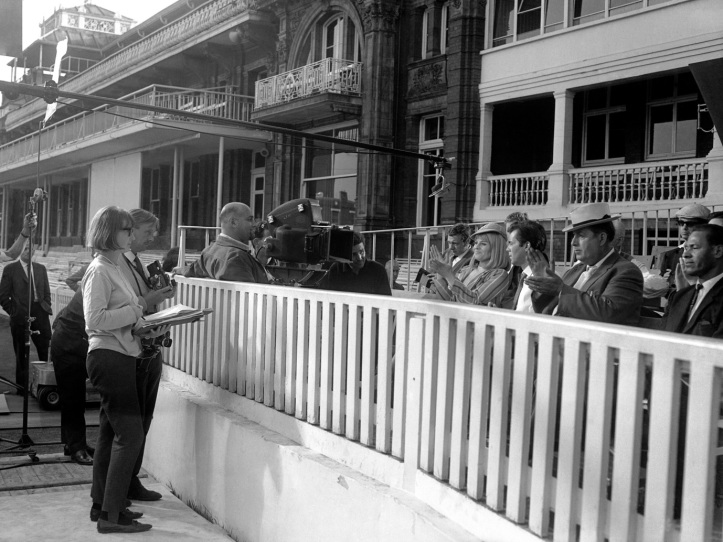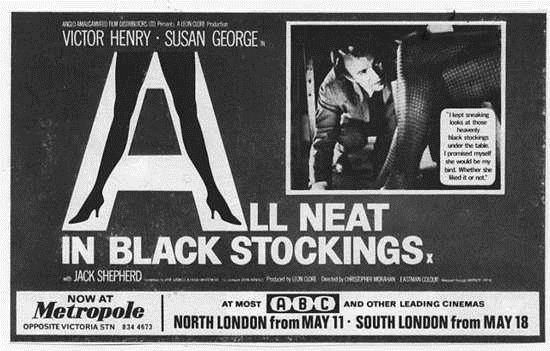By Richard Farmer
With the news that David Bowie might have auditioned for a role in Peter Jackson’s The Lord of the Rings trilogy having recently made headlines, this seems like an appropriate time to think about what might be called ‘counterfactual film history’. It is perhaps easy to forget that the films that we get to watch, as cinemagoers or on television or DVD, are not necessarily the films that producers, directors or writers had in mind when first conceiving them. A plot device or narrative twist that feels absolutely integral to a film might only have been added at the last moment, sometimes against the wishes of at least some of those involved. A star who seems just right for a part might not have been first or even second choice. A location that seems especially appropriate might have been a last-minute stand-in when permission to film at a different site was withdrawn.
What this should make clear is the very obvious idea that a film does not arrive fully formed; rather, it is a made object. And because it is made, it could have been made differently – sometimes very differently, and for a host of different reasons. Other times, films are not made at all, and exist only in pre-production documents and the imagination. For the most part, the behind-the-scenes processes that shape the films that we watch remain largely unknown. On occasion, however, we are offered a glance at the processes that shaped or might have changed the films we watch, giving us tantalising glimpses of what might have been. What is perhaps surprising is that some of these processes are seemingly so mundane, so far removed from the glamour that is so often associated with the world of the movies.
What follow are just five examples of points at which film history became or might have been different. We’d love to hear if you have any stories of what might have been. Please feel free to contribute your examples in the comments section below.
- Alan Bates was engaged to play the lead role of Jimmy Brewster in the deliciously acid satire Nothing But the Best (1964), but his ability to take the part was dependent on the production company taking out an appropriate insurance policy to cover him whilst he was making the film. The Film Finances file for Nothing But the Best shows that the company asked to provide a life insurance policy for Bates would only issue it after a Harley Street physician engaged by David Deutsch, the film’s producer, provided a second opinion stating that Bates was unlikely to drop dead from appendicitis during production. Without the policy, Brewster would have had to have been played by someone else.
- Darling (1965), directed by John Schlesinger from a screenplay by Frederic Raphael, was originally going to begin at Lord’s cricket ground, with Diana (Julie Christie) meeting Robert (Dirk Bogarde) in the queue at the first day of a Test match: she uses him to jump the queue – he has no interest in the cricket (he is a television presenter who has been sent to the ground by his editor), she is an aficionado who has brought opera glasses and a picnic.

(Christie and Bogarde filming at Lord’s, 29 September 1964)
However, despite shooting a sequence at Lord’s, an alternate opening was eventually deemed preferable. In it, Diana is approached to provide a vox pop for a television programme that Robert is making. The changed dynamic between the two main characters probably benefits the film, but deprives viewers of the cricket (which remains curiously underexploited in British cinema).
- Despite the fact that in the mid-1960s film producers seemed to have been falling over themselves, and each other, to make feature films with pop stars, some bands never got the chance to appear on the silver screen. The Kinks, for example, or the Rolling Stones. However, in his autobiography, no less a figure than Michael Winner claims that he was approached, by E. J. Fancey, to make a film with the Stones. According to Winner, Fancey proffered his opinion as to what sort of film it should be: ‘They’re so ugly we’ll ‘ave to make an ‘aunted ‘ouse film with ‘em! That’s all you could do with ‘em, ‘aunt an ‘ouse!’[1] The film, sadly, appears not to have progressed much further than this initial outline, possibly because the band, and its manager Andrew Loog Oldham, were advised that there was less money in the movies than they had supposed.[2] Mick Jagger wasn’t to be denied, though, as his later forays into acting in Performance (1970) – itself something of a house-of-horrors piece – and Ned Kelly (1970) demonstrate. (With thanks to Laura Mayne for the tip-off.)
- The cinematographer Billy Williams was only given the chance to photograph Billion Dollar Brain (1967) because Otto Heller, who had worked on both of the previous Harry Palmer films, The Ipcress File (1965) and Funeral in Berlin (1966), was unable to get an insurance policy that would cover him for location shooting during a Finnish winter so cold that it gave Michael Caine a headache whenever he ventured outside without a hat.[3] The reason why the policy was not forthcoming varies depending on who tells the story – either because of his age (Heller was in his late 60s), his refusal to submit to a medical, or because he took the medical and was found to be in poor health.[4] It is interesting to speculate on how Heller’s technique might have differed from Williams’, and consequently how Billion Dollar Brain might have looked had Heller been able to photograph it.
- Cat Stevens was approached to provide a song for All Neat in Black Stockings (1969), a sex comedy detailing the life and loves of a window-cleaner. Stevens wrote and recorded ‘Twinkie’ for the film, but withdrew the song after attending a preview screening.

As his manager recalled: ‘As far as I was concerned, it was a soft-porn movie. These days, nobody would blink an eye, but back then I thought it was very dodgy for [Cat Stevens] to get involved with it so we didn’t.’[5] Even more intriguingly, Stevens was initially approached to write the song by Lindsay Anderson, who was, at the time, slated to direct All Neat in Black Stockings, but who fell out with producer Leon Clore before filming began. A Lindsay Anderson take on a proto-Robin Askwith Confessions… film; surely one of the great missed opportunities of British cinema.
……………………………………………………………………
[1] Michael Winner, Winner Takes All: A Life of Sorts (Portico, 2005).
[2] Andrew Loog Oldham, Rolling Stoned (Because Entertainment, 2013)
[3] Michael Caine, What’s it all About? (Century, 1992).
[4] John McGrath in Paul Sutton, Talking About Ken Russell (Buffalo Books, 2015).
[5] Dave Thompson, Hearts of Darkness: James Taylor, Jackson Browne, Cat Stevens and the Unlikely Rise of the Singer-songwriter (Backbeat Books, 2012).
Terrific piece, Richard! Thanks for sharing these gems. A few others I’ve come across: 1. Albert Finney starring in the title role of Lawrence of Arabia rather than Peter O’Toole is pretty well known but Marlon Brando was supposedly the first choice ahead of Finney. 2. 2001: A Space Odyssey to have been directed by Alfred Hitchcock or David Lean (yes, really!). And (my favourite) 3. Carry On Up the Khyber to have ended not with the “devils in skirts” revealing what they didn’t wear under their kilts, but instead Sid James dropping his trousers to reveal a pair of bright red lady’s bloomers.
LikeLike
Just a little one. My friend Thomas Baptiste (The Ipcress File, Sunday Bloody Sunday) told me that he was cast as Matthew the West Indian dustbinman in Heavens Above! He was thrilled. Until then he had only been cast in bit roles in British movies. He was looking forward to the start of fllming (I am not certain if he had signed a contract) but the African American actor Brock Peters, fresh from his success in To Kill a Mockingbird, was filming The L-Shaped Room as Johnny the jazz musician & giving such a convincing West Indian accent that the makers of Heavens Above! decided to replace Tommy with Brock. Tommy was heartbroken & was advised to sue, but his agent or Equity, not sure which, strongly advised him to let the matter rest or risk ruining his film career. Tommy is a lovely man, now retired & living in Brighton.
LikeLiked by 1 person
That’s really interesting! Thanks for sharing.
LikeLike